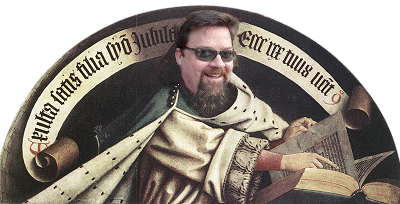Prefatoriness: in lieu of a "roast," Frank has given Phil the perfect toast. I am working on my own (by contrast) droning, heavy-handed, somber encomium. But in the interim, while it's being readied, and interrupting my series on marriage... two posts on particular redemption, of which this is the first.
And so, without further eloquence:
Predictable but necessary clarifications
Absolutely 100% terrific brothers and sisters would not (yet) agree with what I'm about to explain. To me, that is
zero barrier to fellowship or love. I am going to try to explain why I think this is an important doctrine, but it isn't an all-important doctrine. It has far-reaching implications, but not so as to define Christianity to the exclusion of all who don't agree. At our church, particular redemption not spelled out in the statement of faith, and it is not required either that members or leaders precisely think as I do about it — nor would I ever want that to change.
This isn't really my main post on the subject, but the main post will need this one to come first. That doesn't mean this one doesn't count!
"Limited? Ew." To those unfamiliar with the concept, "particular redemption" is more commonly known as
Limited atonement, being the "L" of
the acronym "TULIP." I think almost no adherent really likes the term much, because everyone's first and most natural reaction would be indignantly to burst out with "What?! —
limit Christ's atonement? I don't think so!" However, any change would alter the neat little acronym (— TU
PIP? TU
DIP?).
However, on cooler reflection one soon realizes that
every Christian necessarily limits Christ's atonement in some manner. Only universalists do not, and it's debatable whether they should be regarded as Christian.
Think about it.
Every Christian believes that
some people — at least Judas (Jn. 17:12), and the Beast and the False Prophet (Rev. 19:20), will suffer the wrath of God for their sins, unforgiven and "unatoned," for all eternity. So then,
every Christian would "limit" the atonement of Christ by saying that it will not save those who go to Hell. Their sins are still on them; Christ has not removed them. Otherwise we're left with the universe-obliterating absurdity of sinless people forever suffering God's wrath for no reason whatever.
The usual rejoinder is that oh yes, Christ paid for absolutely every last sin, but the beneficiaries have to believe, have to accept Him. But isn't unbelief a sin (cf. Rom. 14:23)? Isn't repentant faith a command (1 Jn. 3:23), and isn't refusal to believe a sin? So doesn't this position "limit" the atonement by saying, in effect, "Yeah, but not
those sins"? And doesn't that add the conceivably-worse necessary corollary that I then must save myself by adding the one element that makes all the difference between Heaven and Hell for me, an element
not provided by Christ's work on the Cross?
The question, then, isn't
whether Christians "limit" Christ's atonement. All Christians do. The question is
how it should be "limited," Biblically.
Rounding up. I commonly say that I am a 4.95-4.97 point Calvinist. When I say that, I mean that I think that anyone who believes in the Bible either affirms T, U, I and P, or he's fudging on core Biblical doctrine for some other reason. Those doctrines are not merely reasonable conclusions of what Scripture teaches — they simply
are what Scripture teaches, straight-up and in so many words.
The point on which I measure .95-.97 is, of course, L. Now you'll observe correctly that 4.95 "rounds up" very nicely to 5, and so I'll sign on as a 5-point Calvinist without blushing. But the reason for the .03-.05 variation is simply that, unlike the other four points, there is no single verse that straight-up lays the doctrine down in so many words, and there are a couple of challenging verses.
However, the reason why the variation is
only .03-.05 is because I think that the cumulative Biblical case for "L" is overwhelming, the "challenging" verses are at least equally challenging for other positions, and every alternative explanation I've ever heard very soon comes to very serious Biblical grief.
Talking the doctrine
What this position means is that I believe the Biblical teaching that the plan of redemption is an eternal plan that was laid and finalized before the first second ticked on the cosmos (cf. Eph. 1:4ff.; 3:11). I believe the Biblical teaching that, in that plan, the Father saw mankind as fallen, guilty, dead and hopeless — and of that mass He selected a subset for salvation (Eph. 1:4ff.), giving them to the Son that the Son should give them eternal life (Jn. 17:2). This number, while a subset, is nonetheless a vast and humanly-innumerable international crowd (Rev. 7:9).
I believe the Biblical teaching that the Son made absolutely full satisfaction for every one of those thus selected by the Father, laying down His life for them, satisfying God's justice and wrath for them, saving them, and guaranteeing their conversion, preservation and resurrection (Matt. 20:28; Mk. 10:45; Jn. 6:37, 44-45; 10:11, 15, 26-30; Rom 3:24-25; Eph. 5:25f.). He came into the world to
save sinners (Mt. 1:21; 1 Tim. 1:15), not to
try to save them, or to give them an opportunity to save themselves. He prays for them (Jn. 17); He does not even pray for the world (Jn. 17:9). All of the blessings He achieved for
any one of them are given to
every one of them (Rom. 8:29-39). If Christ died for you, you will surely be saved. It cannot be otherwise — unless you imagine that He can fail in achieving the eternal purpose of the God who succeeds in accomplishing all He sets out to accomplish (Ps. 115:3; Eph. 1:11).
This is why, as one sees in reading the small selection of Scriptures above, the Bible characteristically speaks of the atonement in
particular terms. Christ dies for
the sheep, for
His friends, for
the church, for
us (believers), for
you (believers). It is also why Scripture characteristically speaks of His saving design as
effectual. That is, He
redeems, He
saves, He
reconciles, He
propitiates; He does not
try to redeem
, try to save
, try to reconcile
, try to propitiate; He does not characteristically make redemption
available, make salvation
available, make reconciliation
available, make propitiation
available.
The practical upshot
What difference does it make for me that I see this doctrine in Scripture? I'll be candid and specific. (Readers:
No! Really?)
Credit. It means that I give literally every last atom of credit and glory for my salvation to the Triune God, and I trace every bit of it to the eternal counsels of God ultimately accomplished in Christ's work on the Cross. I contribute
absolutely nothing to my salvation. (The reader may be recalling at this point that
I did write a book along these lines, explaining at much greater length — though not at all dwelling on "L.")
Responsibility. "But didn't you have to hear the Gospel, repent and believe?" a newcomer asks. Absolutely (see that selfsame book, at
great length). But the point is that even this repentance and faith was assured to me by Christ's work on the Cross (Rom. 8:29-39; Eph. 2:8-9; Phil. 1:29).
Evangelism. It also does affect the way I evangelize.
Now, it has
no negative effect on
whom I evangelize. The assumption that affirming the Biblical doctrine of election makes evangelism pointless is and always has been off-base. I have no way of knowing that
anyone I talk to is not elect. Though there are many reprobate, Scripture only certainly identifies three individuals that I can think of: Judas, the Beast, and the False Prophet. If I am not talking to one of them, I have no reason for assuming that (s)he is not elect, and will not come to saving faith through my giving the Gospel (cf. Rom. 1:16).
So believing in particular redemption has
zero limiting effect on whom I evangelize.
It does, however, have an effect on what I tell them. Now, many "L-people" have no problem saying "Christ died for your sins" to unsaved people. For my part, I do have a problem with that.
First, I notice that the apostles never found it necessary to say, in their evangelism of the unsaved. Not once.
Second, to me, saying "Christ died for your sins"
is exactly the same thing as saying "You are saved, redeemed, reconciled, and assured of Heaven." Unless and until they trust Christ savingly, I have no assurance that this is true of them. So I don't say it until I have warrant.
Instead, I say that Christ died for sinners just like me and just like them. I say that Christ calls them to Himself, invites them to come. I say that, if they come, they will find their sins forgiven, for He is able to save to the uttermost
all who draw near to the Father through Him.

After all, what does an unbeliever need to know? Does he need to know whether Christ died for him individually? Or does he need to know whether, if he comes to Christ in repentant faith, He will find Christ willing and ready to receive him and forgive Him?
Remember, this is the point at which all Christians agree: if someone does not come to Christ in repentant faith, the death of Christ will do him no good. That is, his sins
will not be forgiven, and he
will suffer God's wrath for eternity. So why is it essential to do what the apostles
never did, and tell him that Christ died for him? If Christ died for all his sins, then how is sin still a problem? Isn't that the same as telling him he has nothing to worry about, since "Jesus paid it all"? If He "paid it all," then I'm set!
By the way, I'm not being merely theoretical. My memory from my pagan days, decades ago, is that I listened with contempt to any Christian who tried to tell me I needed to believe in Jesus to be saved from my sins. I didn't believe what they were saying. But I thought, "Anyway, if you're right, sounds like Jesus took care of my 'sin'-problem anyway, so it should work out."
Okey-doke, are we all on the same page now – at least insofar as we understand what we’re talking about?
Terrific. Then, Lord willing, I’ll make my
actual point in the next post.

 t is thought nowadays that a man must not try to proclaim the gospel, unless he has had a good education. To try and preach Christ, and yet to commit grammatical blunders, is looked upon as a grave offence. People are mightly offended at the idea of the gospel being properly preached by an uneducated man. This I believe to be a very injurious mistake.
t is thought nowadays that a man must not try to proclaim the gospel, unless he has had a good education. To try and preach Christ, and yet to commit grammatical blunders, is looked upon as a grave offence. People are mightly offended at the idea of the gospel being properly preached by an uneducated man. This I believe to be a very injurious mistake.




















 The
The  he only feeling I ever want to have is just this,—I want to feel that I am a sinner and that Christ is my Saviour. You may keep your visions, and ecstasies and raptures, and dancings to yourselves; the only feeling that I desire to have is deep repentance and humble faith; and if, poor sinner, you have got that, you are saved.
he only feeling I ever want to have is just this,—I want to feel that I am a sinner and that Christ is my Saviour. You may keep your visions, and ecstasies and raptures, and dancings to yourselves; the only feeling that I desire to have is deep repentance and humble faith; and if, poor sinner, you have got that, you are saved.











 he reproach of Christ, in these days, takes this shape. "Oh," say they, "the man is too precise. He is right; but still, truth is not always to be spoken. The thing is wrong, no doubt, which he denounces, but still the time has not come yet; we must be lenient towards these things. The man is right in what he says, but we must not be too precise nowadays. We must give and take a little—there must be charity."
he reproach of Christ, in these days, takes this shape. "Oh," say they, "the man is too precise. He is right; but still, truth is not always to be spoken. The thing is wrong, no doubt, which he denounces, but still the time has not come yet; we must be lenient towards these things. The man is right in what he says, but we must not be too precise nowadays. We must give and take a little—there must be charity."

















